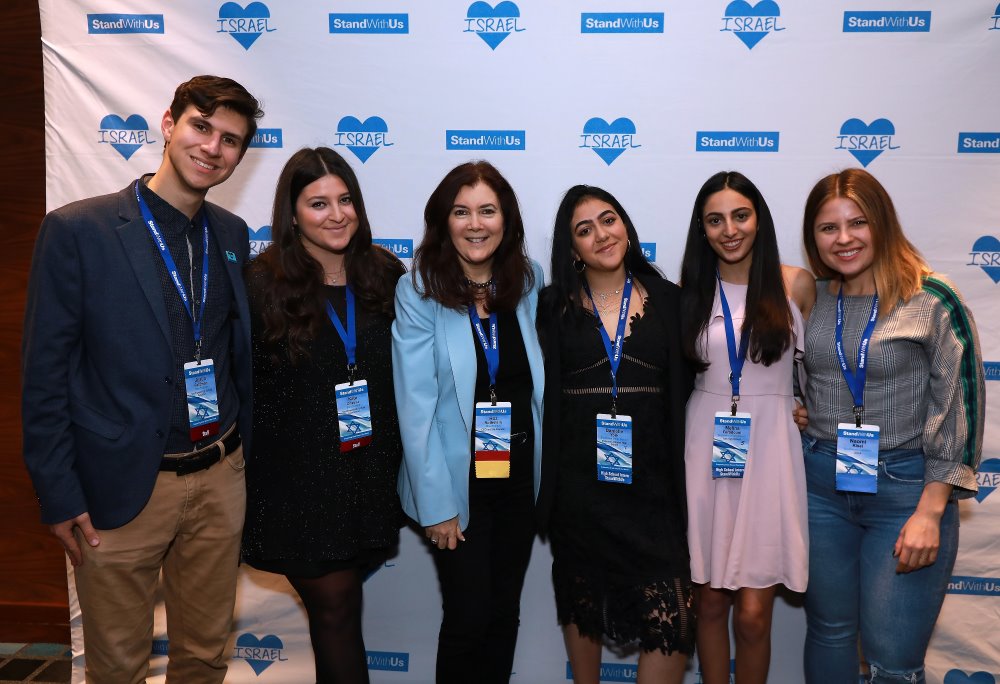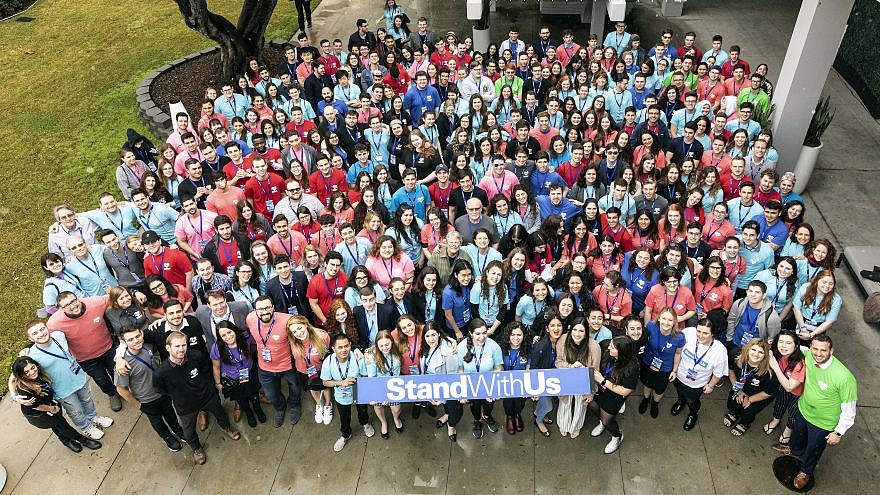“I support Israel not because Israel needs my support,” Egyptian-born Hussein Aboubakr, 29, proclaimed in front of 500 people, “but because I need to support Israel in order to the best version I can ever be of myself.”
Jewish and non-Jewish lay leaders, activists, young professionals, academics and others in the Israel advocacy community from across the world erupted into applause and a hearty “Am Yisrael Chai” chant. The diverse coalition convened in Los Angeles over the first weekend of March for the fourth annual “Israel in Focus” International Conference hosted by StandWithUs, a nonprofit pro-Israel education with 18 offices across five countries.
“People who care about Israel are from every background,” Roz Rothstein, StandWithUs co-founder and CEO, told JNS. “The advocacy has become very international. It’s all about building bridges to different faiths, ones represented here: Hindus, Christians and Muslims.”

The opening night remarks delivered by the Arab Muslim Aboubakr set the tone. From a young age, Aboubakr was taught virulent Jew-hatred and indoctrinated with anti-Israel propaganda in school, mosques, at home and in the streets of his native Cairo.
“I can’t tell you how many times in art class in school we drew Egyptian soldiers killing Jews and Israeli soldiers,” he said. “We thought killing Jews was a duty everyone had to take on.”
Aboubakr, who fled Cairo with the help of Christian friends shortly after the Tahrir Square “Arab Spring” protests in 2011, settled in Northern California and now teaches Hebrew full-time.
“There is hope for change,” he said. “But it requires a lot of work and a lot of education.”
Finding common ground
Seated in the cavernous hotel ballroom, Danielle Yablonka, 18, a high school student from Miami, was particularly interested in how art was used in Aboubakr’s youth as a powerful indoctrination tool.
“It’s sad, but also mind-boggling and yet pretty brilliant,” Yablonka, a prolific painter in her own right, told JNS. “Art can wield so much influence.”
That’s why Yablonka, the grandchild of Holocaust survivors, uses her to educate the community. She recently displayed a series of paintings reimagining the Nazi-era yellow star, replacing “Jude” with the word “Pride,” to a group of 50 Holocaust survivors back in Boca Raton, Fla.
“Many of them told me they’ll die happy knowing the next generation won’t forget,” she said. “That was all the validation I need to know that what I’m doing means something. I hope my art makes people think and want to advocate even more.”
During the conference, students attended a variety of panel discussions addressing the anti-Israel climate many college students are met with on campus. The range included how to fight BDS legislation in student governments, holding academics with anti-Israel biases to account, and how campus alumni are remaining involved and forming connections with allied communities on campuses.
On the panel, dubbed “A Christian, a Buddhist, a Muslim and a Hindu Walk into a Pro-Israel Conference,” interfaith pro-Israel activists like Moussa Kone, 21, spoke to pro-Israel students about finding “common ground” in an effort to form on-campus alliances.
“I’m Muslim and black in America,” said Kone, a Mali-born student at Portland State University. “I know how it feels to be in your shoes. That’s why I want to help. Start small and be willing to listen.”
Aras-Nathan Kuel, 28, who came to represent the German-Israeli Society—one of Germany’s leading pro-Israel organizations—spoke on a panel about the rise in anti-Semitism throughout Europe. He took heart in the passion of American students he interacted with and whose panels discussions he heard.
“It’s amazing to be here around so many American students who are so involved in pro-Israel spaces,” he said. “It’s incredible how normal it is here. That isn’t the case in Germany. This encourages me to return to Berlin, and strengthen our support and fight anti-Semitism in all forms.”
‘We need leadership’
Einat Wilf, a former Israeli politician who served as a member of the Knesset for Independence and the Labor Party, spoke on the “Feminism, Zionism and Anti-Semitism” panel about the controversy surrounding the founders of the Women’s March in the United States, prompted to form after the election of U.S. President Donald Trump.
“This has nothing to do with Israel,” she said. “What is happening in the Women’s March is the use of Israel, the use of anti-Zionism, in order to send a message to Jews that you do not belong.”
Wilf went on to say that she sees echoes of 19th-century Europe and the rising tides of anti-Semitism that drove Theodor Herzl to his Zionist dream.
“She’s a game-changer that people need to take notice of,” Justin Feldman, 21, a student at University of California, Los Angeles said after hearing Wilf speak.
Several elected officials currently holding office also attended the conference, including New York Rep. Lee Zeldin and Mayor Gabriel Groisman of Bal Harbour, Fla. Groisman, who passed the nation’s first municipal anti-BDS law, offered advice to young pro-Israel stalwarts listening.
“There’s a lot that needs to be done on the municipal level, state level and federal levels,” said Groisman. “But the Jewish community, the pro-Israel community is a small community. That’s the truth. You can’t think [public officials] have it covered. We need leadership from every single person sitting here today. That means in your schools, your friend circles and organizations you’re in. We need leadership from everyone when it comes to fighting anti-Semitism and standing up for the State of Israel.”
Ruby Russell, 16, a high school student from Boston, declared in a speech that she sees a run for public office in her future. After hearing words from elected officials like Groisman, who govern with a pro-Israel platform (granted, Bal Harbour in Miami-Dade County has a population of just 2,500, a significant percentage of whom are Jewish), made her dream seem that much more attainable.
“I can see myself in them, and it’s very empowering,” said Russell. “I take inspiration in knowing that we—the future generation—have what it takes to not only speak out, but to make people think critically, raise our voices and make change.”


























